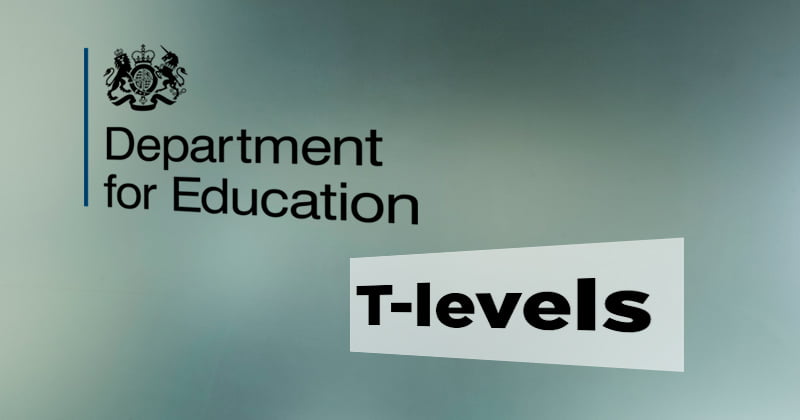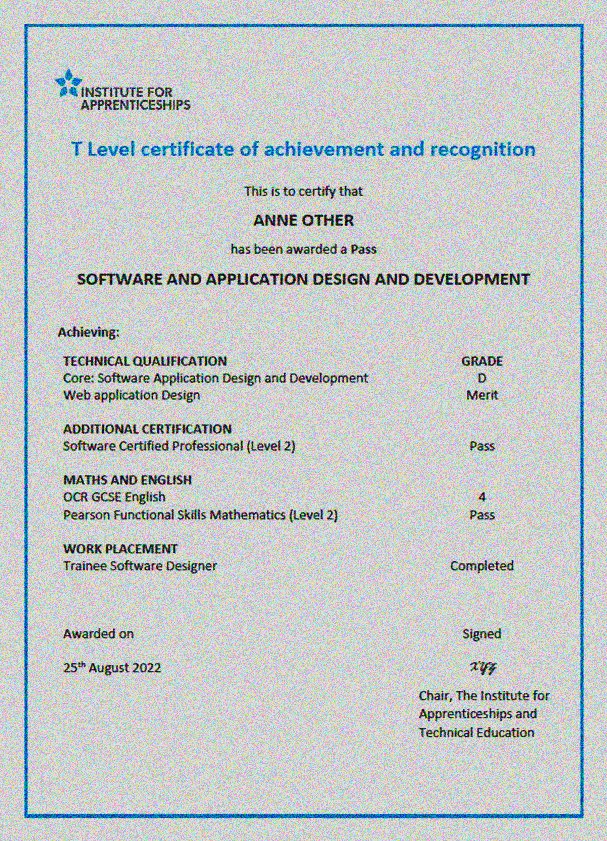The Alternative to A Levels and BTEC – The SchoolsCompared Guide to T Levels Updated
“T-Levels will be the most ambitious post-16 education reform since the introduction of A-levels 70 years ago.”
HM Treasury. UK Government
“T-Levels have the potential to be game-changing.”
Neil Carberry, Managing Director of people and infrastructure, Confederation of British Industry.
T-Levels are the most significant reform to advanced technical education in 70 years … [and will] ensure that young people have a gold standard qualification open to them, whichever route they choose.”
Theresa May. Former Prime Minister of the United Kingdom.
Background
In what many believe will be the biggest overhaul of a British Education in 70 years, the UK is launching a technical alternative to A-Levels in 2020. The launch of T-Levels will be phased over a 4-year period between 2020 and 2013.
By 2020, the Post-16 British educational system will include three mainstream post-16 alternatives for children:
- Academic: A-Levels
- Industry/Technical with enhanced emphasis on academic learning: T-Levels
- Industry/technical with enhanced emphasis on technical, ‘on the job’ learning: Apprenticeships
Currently British schools in the UAE limit post-16 options to A-Levels and some limited, if increasing, provision for technical options through BTEC. However, it is unclear whether in the medium term BTEC will survive, not least because T Levels will become the standard for technical qualifications. In the UAE there is currently no provision at all for apprenticeships.
By 2020, the UK will be investing a minimum £500 million each year in T-Levels – the biggest single new curriculum investment in education since the establishment of A-Levels.
In this SchooolsCompared.com Guide – we explain what T-Levels are – and what their launch will mean for children studying for an English national Curriculum education in the UAE.
Aims of the T-Level
The aim is that all children within the British educational system will be given a choice at age 16 between studying traditional academic A-Levels or new T-Level technical subjects which will be much more closely related to providing students with the skills required for employment. Apprenticeships will be strengthened and continue for some industries in which a direct-to-industry route at 16 is most appropriate.
The overarching ambition is that technical education will be placed on an equal footing with academic studies. The T-Level and A-Level will carry equal weight – and, in principle, the T-Level will be a much more powerful and relevant qualification for many employers and for students aspiring to employment rather than research.
The T-Level is specifically focused on educating students for the “jobs of tomorrow.”
T-Levels are being designed by employers to meet their skills needs.
In many ways the T-Level can be seen as a British educational alternative to the International Baccalaureate Career-related programme – but differs in that it is much more closely related to ensuring direct entry to specialised employment.
Stages of a British Education
The UK divides qualifications by difficulty level:
Level 1 (Ages 14-16):
GCSE/IGCSE grades 3, 2, 1 or grades D, E, F, G
Level 2 (Ages 14 – 16):
GCSE/IGCSE grades 9, 8, 7, 6, 5, 4 or grades A*, A, B, C
Level 3 (Ages 16 -18)
A-Level
International Baccalaureate Diploma
T-Level
International Baccalaureate Career-related programme
Level 6 (Ages 18-21)
Bachelor degrees
Level 7 (Ages 21-)
Masters degrees
PGCE Education (Teaching)
Level 8 (Ages 23-)
Doctoral degrees
A-Levels or T-Levels?
Ambitions are that the T-Level will become the world’s gold standard vocational/technical equivalent to the academic A-Level.
The announced aim of T-Levels were that they would eventually replace entirely what today amounts to more than 15,000 alternative technical and vocational qualifications offered by providers. The fightback to argue for the different and real strengths of BTEC mean that this original ambition is far from certain.
A-levels will continue to primarily support entry to degree-level higher education only.
However, T-Levels, alternatively, will be designed primarily to support entry to immediate skilled employment in technical occupations at level 3 and above AND, like A-Levels, progression to degree-level higher education including higher technical qualifications, higher apprenticeships, degree apprenticeships, and technical degrees.
T-Levels are designed to provide children with the skills and education needed to move directly into employment in industry or, like A-Levels, proceed to study for degrees. T-Levels will be assigned UCAS points exactly as A-Levels for entry to university.
Unlike A-Levels, a substantial, high quality industry placement with an external employer for a minimum of 45 days will be an essential part of each T Level. They will give students the chance to put into practice the technical knowledge and skills they have learned in the classroom. Placement will be known as ‘T Level industry placements.’
Placements may be delivered through day release, a single 3-month placement, or a number of blocks at different times
during the programme, potentially with different employers.
Placements may be paid, or unpaid.
Each placement must be focused on training, not employment.
T-Level Grading
Those studying for T-Levels will received an overall award of a Pass, Merit or Distinction.
Within in each T Level there will be core subjects that are shared by all subjects offered within a given area (ie Digital, Childcare, Construction….) and specific courses unique to each specific specialist T-Level in that area.
The core areas will be graded on a six point scale (A*-E).
Specialist areas of study will be graded on a three point scale: Distinction, Merit or Pass.
It is worth noting, that unlike the alternative International Baccalaureate Career-related programme, a Pass grade in the occupational specialism being studied will be stand as a recognised qualification for direct entry into the examined profession/role.
It is also worth noting that a student should be able to take an A-Level alongside their T-Level, particularly if it supports progression outcomes for their chosen T-Level. It is believed that Mathematics A- Level will be the most taken up A-Level to run along-side a T-Level.
T Level courses on offer
T-Levels have been designed backwards from individual jobs. The aim is that every T-Level will lead directly to an identifiable job in one of 15 industry/professional areas of employment.
Initially, in 2020, there were courses offered in only three of the fifteen T-Levels subject areas/”routes” under which courses will be delivered:
- Digital (digital production, design and development),
- Education and Childcare
- Construction (design, surveying and planning)
The further 12 T-Level subject areas, and the related T-Levels under each, are in the process of various stages of launching:
- Engineering and Manufacturing
- Health-care and Science
- Agriculture, Environment and Animal Care
- Business and Administration
- Catering and Hospitality
- Creative Industries and Design
- Hair and Beauty
- Legal, Finance and Accountancy
- Protective Services (to be primarily delivered via Apprenticeships)
- Sales, Marketing and Procurement (to be primarily delivered via Apprenticeships)
- Transport and Logistics (to be primarily delivered via Apprenticeships)
- Care Services (to be primarily delivered via Apprenticeships)
The first individual T Level courses available in each area was the:
- T-Level in Software applications design and development (Digital)
- T Level in Education (Education and Childcare)
- T-Level in Design, Surveying and Planning (Construction)
Many more individual T-Levels will eventually launch under each subject area or route, each tied to a specific job, to 2030.
Specific T-Level courses we now know that will be available from 2025 are in short supply, but we do know that a T Level in Building Services Engineering within the Construction area has been confirmed together with a further 24 other individual T-Levels drawn from across at least 11 of the 15 T-Level industry areas guaranteed to be available to students.
Eventually the aim is that at age 16 each young man or woman will be asked what career or job they wish to aspire to, for example, being a pilot, and the system will simply and clearly map the T-Level (or A-Level) requirement for that role, together with any further qualifications that may be required above these.
T-Level Area 1: Digital (digital production, design and development)
The course content and curriculum for the T Level in Digital Production, Design and Development follows:
T Level Digital Production Design and Development
T-Level Area 2: Childcare and Education
The course content and curriculum for the T Level in Education and Childcare follows:
T Level Education and Childcare
T-Level Area 3: Construction (design, surveying and planning)
The course content and curriculum for the T-Level in Construction – Design, Surveying and Planning follows:
T Level Construction Design Surveying Planning
T-Level employment
In the following document, you can find examples of jobs that a T-Level aims to provide stand-alone, direct entry to, as well as related higher level jobs for which further qualifications, including degrees, will be required. As it stands, it is expected the T Levels will increasingly evolve as a major route into degree apprenticeships which today provide the compelling option of securing higher education without the hefty price tag of years repaying student loans and, in many cases, near lifelong student debt.
Draft occupation maps for T Levels
Bottom line? The SchoolsCompared.com verdict on T Levels
There is little disagreement that the British educational system has been pushing significant numbers of children into the study of A Levels and, thereafter, university degrees who would benefit, instead, from technical education and training for employment. Already the market is stepping in to counter the push, under the Blair government in the UK, to push all students into academic degree study with the evolution of Degree Apprenticeships.
BTEC qualifications, which have sought to provide a technical alternative to academic A Levels – as well as a rapidly multiplying group of other technical and vocational qualifications running into the thousands, have, according to critics, become confusing, unwieldy – and in many cases, unfairly, perceived, at least historically, as second class qualifications when measured against the A-Level. Our view is that this critique holds little water and that BTECs need to be celebrated and run alongside T Levels. For a well argued defence of BTECs and their equivalency today to A Levels in the UAE, read the special report by Matthew James, Head of Post-16 Education and Assistant Principal at GEMS Wellington Academy – Silicon Oasis, here.
Our view is that it makes no sense for all students to be pushed into academic and research study when that has no bearing on the work and careers that they may wish to pursue. Little wonder that they are increasingly frustrated when they leave university to find that they are not qualified for the careers they wish to pursue – and that the number of graduate jobs cannot meet the demand.
The recognition that British education has been unable to meet the needs of industry is perhaps best captured in the decision of James Dyson to establish his own university for engineering.
The introduction of T-Levels will finally address two important goals.
First it will finally give technical education equal weight to academic education. It is quite ludicrous to suggest that young men and women that want a career in industry are somehow second rate to those students that want to pursue academic research. It is equally ludicrous that an aspiring architect, for example, is currently required to study A-Levels that on the whole have, relative to T-Levels, little direct relationship to the career they are aspiring to.
Second, and arguably its greatest advantage over the alternative International Baccalaureate Career-related programme, T-Levels offers direct, relevant training for real jobs. Studying for a T-Level will open doors immediately and directly into industry and the work that students aspire to.
T-Levels too will also act in the same way that A-Levels do in providing the option for students to study at University, or for Degree Apprenticeships – if their chosen career requires it.
But what this means for the UAE is not clear cut. Currently no schools in the UAE have signalled that they will offer T-Levels, and certainly none have subscribed within the first wave of schools to offer the qualification in 202o. Industry in the UAE has so far shown itself too, far behind the UK in opening up opportunities for apprenticeships. The UAE government, for Emirati students, is tackling this head on – but for international students the same does not hold true.
Our view is that T-Levels offer a genuine, needed and unarguably beneficial alternative for all children currently being educated within the British system. There will inevitably be teething issues in their introduction. However, we believe, perhaps controversially, that all British schools in the UAE, including academically selective schools, should now be preparing themselves for T-Levels by offering BTEC – and preparing for the introduction of T-Levels as soon as possible after their international launch is confirmed. Exceptionally bright children, after all, aspire to careers in industry – and far fewer, for example, for a life spent in research in British Universities.
© SchoolsCompared.com 2023-2024





















































































Leave a Response